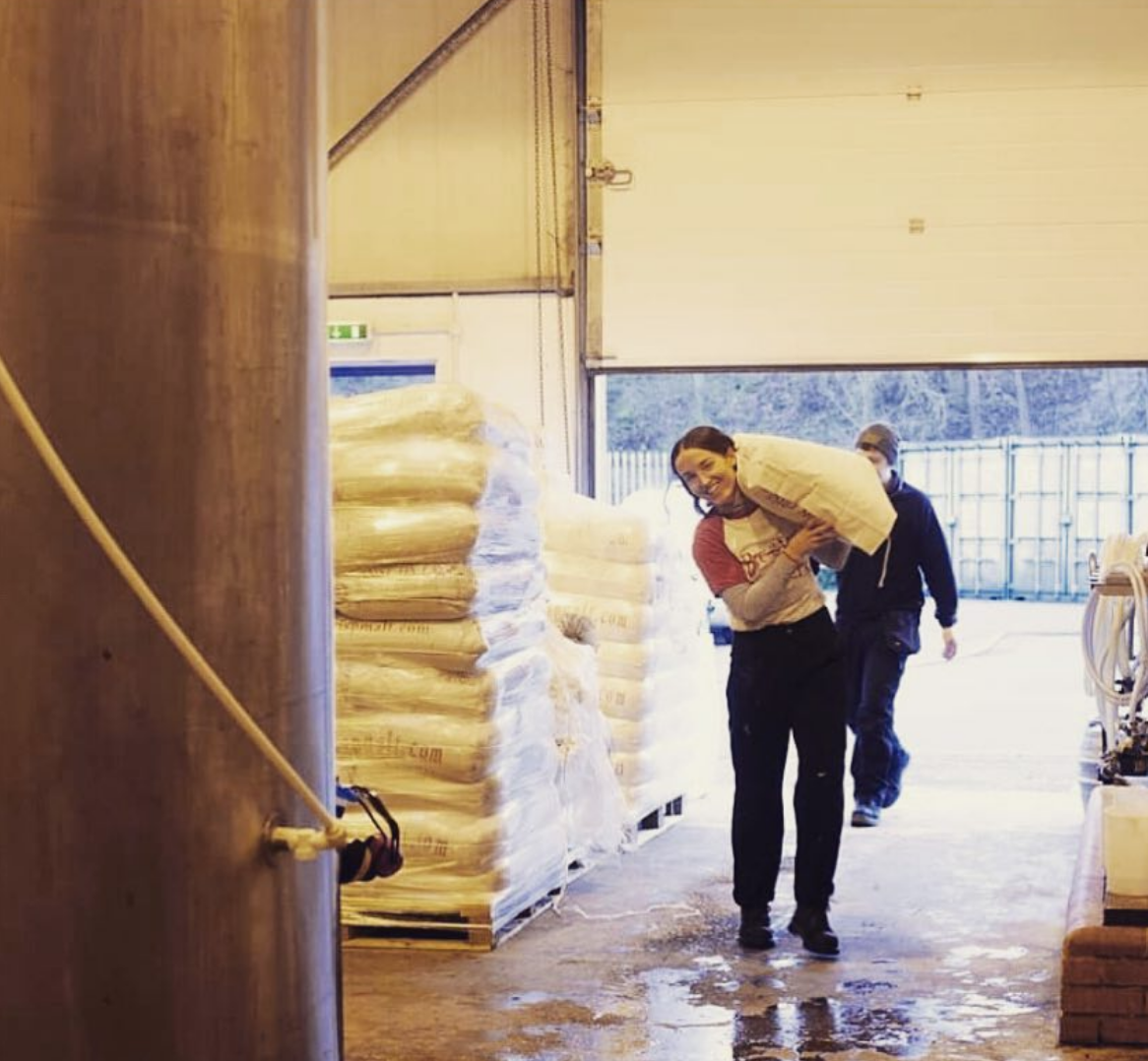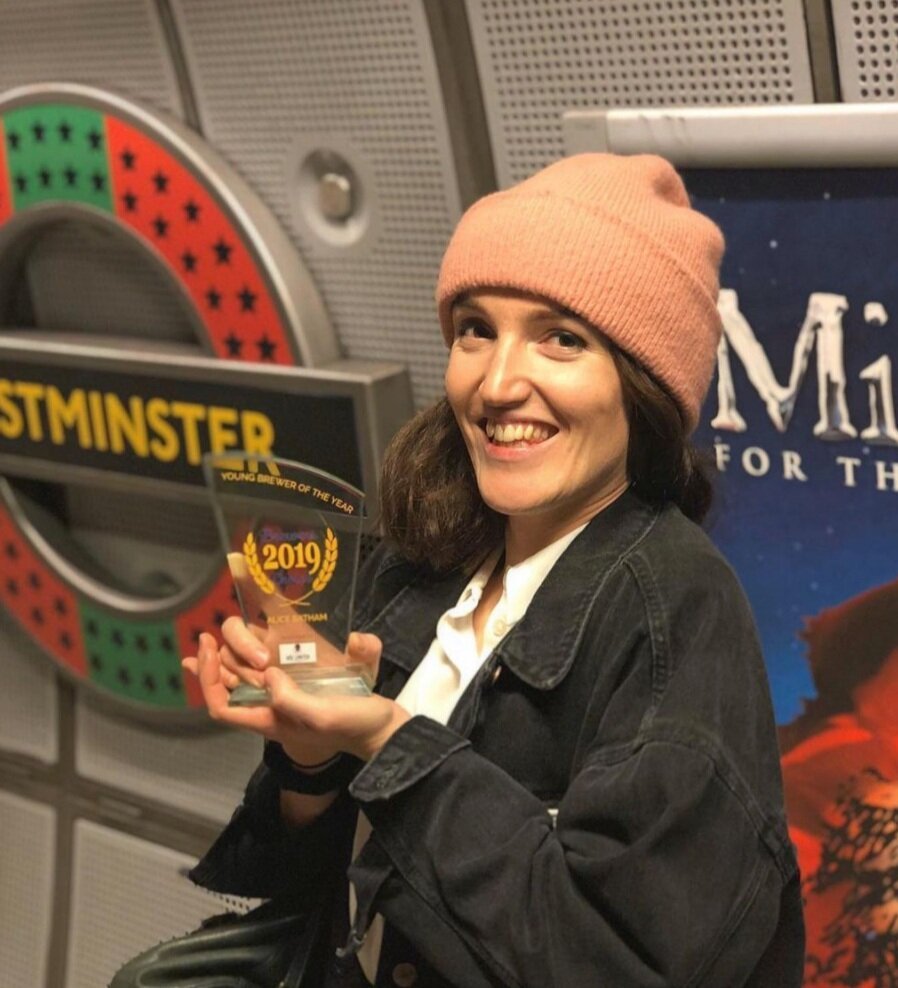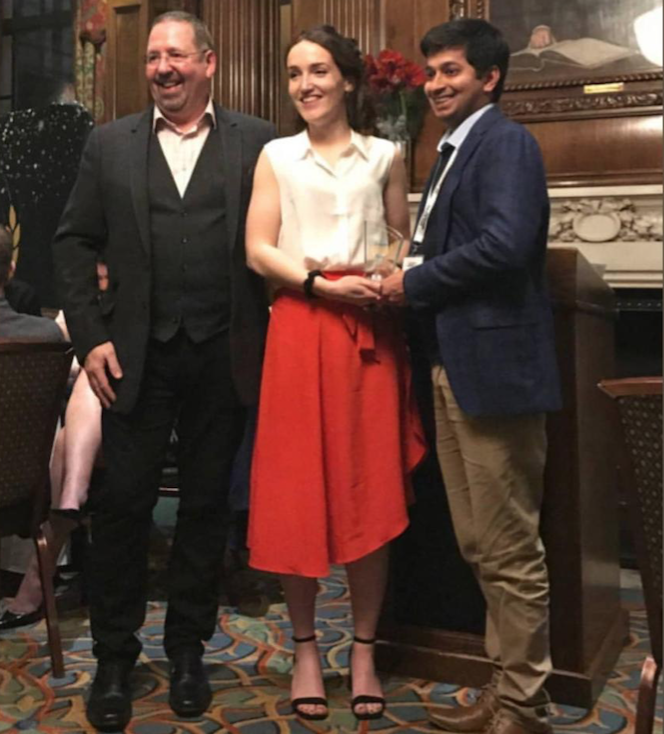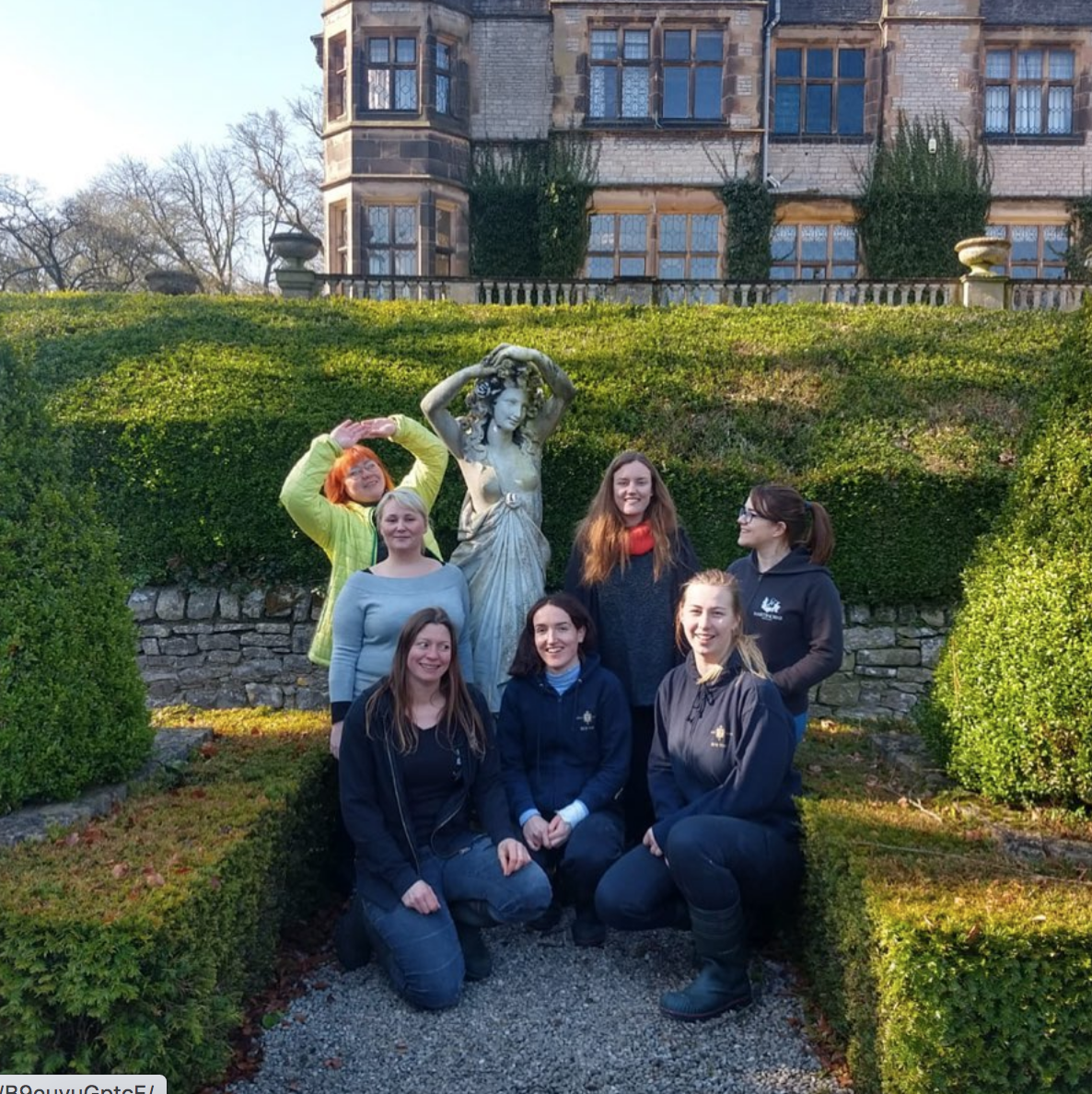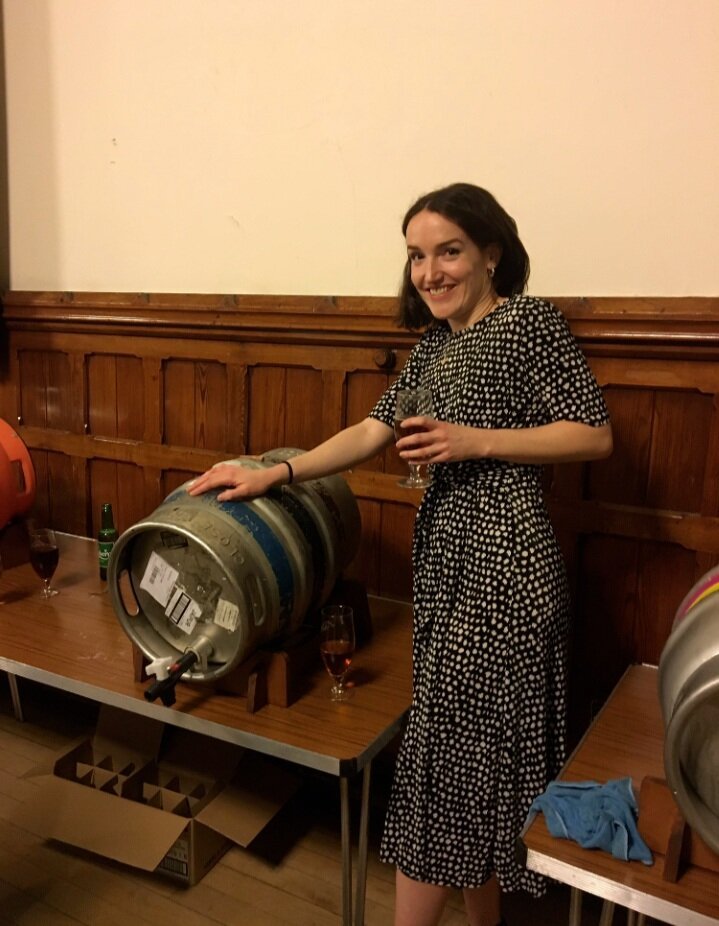Behind the Bar with Alice Batham
This interview with Alice is special, because was the first Behind the Bar that I have actually been able to conduct in person. At the beginning of September, me and my wife took a flying visit up to Bakewell to visit my parents between lockdowns. During this trip I took the opportunity to interview Alice Batham, who at the time was part of the brewing team at Thornbridge Brewery.
From the moment we sat down together in the Thornbridge taproom, she immediately started asking me about myself, my background, Burum Collective, what my wife does for a living. Making her one of the hardest people I have interviewed.
Alice is so friendly that she essentially started interviewing me. Not that I didn’t appreciate this however, I was pretty nervous before sitting down, and Alice’s warmth put me at ease straight away. We grabbed two half pints, one of Lord Marples, one of Tzara and settled in.
When did you start working here and how did you get into beer?
Alice: I started with Thornbridge in October 2019 and I’ve been fully trained since the beginning of lockdown. You work your way through all the different types of brewing shifts, and we brew four times a day, which is quite a bit more than some breweries. It means you get to do lots of different things and it is pretty varied. There are two main teams, the brewing team and then the brewery operatives, there are no set roles within those teams, we are all trained in each of those jobs. It’s really nice, we’re a pretty young team.
My family own a brewery, so I have actually grown up in the industry. When I was younger, I used to go to the brewery with my Dad, it was only ever like a Saturday, or Sunday kind of thing. I was never pressured into going into beer. I went to University to do English and - it sounds like super cliche whenever I say this to people, but I went and lived in Australia for a bit. Their bar and pub scene is just so different and I realised how much I loved it and missed it.
So when I went home I finished my English degree and then did a Masters in Brewing. I then did a couple of years at Brewster’s, working under Sara. Brewster’s is one of the few female lead breweries in the UK or was at the time. She always pushed me to do female lead stuff, like Project Venus.
Helen: Why did you decide to that particular course, as opposed to other beer education routes?
Alice: I did it because it was a one-year course and I knew that I didn’t want to be at Uni for another four years. I chose Nottingham because part of the course was practical and that was really important to me. Also Nottingham is the home of the International Centre for Brewing Science so most of the lecturers had worked in the industry, not just in academia. It was just fantastic, to be taught by people who were enthusiastic in not just the science but in the practical work too.
I do think that it is a shame that so many people at University doing engineering or science degrees don’t realise that you can do this as a career. I really want to be able to go to student career events and be like “Hey! This is an exciting career path you can go down”. I think it would really help with trying to make the industry more diverse and inclusive.
Helen: I have spoken to some women in beer who feel like they went down the beer education route because they had to, to stand out and to have that piece of paper to show for when people question your ability. Is that something you can relate to or is it not even something that crossed your mind?
Alice: I think so, and I still struggle with that now. I still struggle with that now, and I am still trying to prove myself. Even today I was carrying quite a lot of weight in tubs up a spiral staircase, and one of the guys asked if I wanted a hand, and even though I know that everyone is aware I am more than capable… my instinct is just to say no and that I’m fine. Even if I did need a hand.
I don’t know if it is my personality or if it is because I have been born into this. My dad is fifth generation and I have this fear that people will think I just… walked into the job? Especially if I ever get a job at Bathams (the family brewery) it has been going for 140 years. I do not want people to think it has just been handed to me. I am just very aware of it from that perspective too, I think.
I haven’t ever worked at the brewery on a full-time basis. I did my research project there when I was doing my masters but that’s it since being a brewer. Bathams is in the Midlands and is very traditional; it has been passed down the sons for five generations. I have two sisters. One of which works for the brewery, working with my Uncle in looking after the pubs. Which is so nice because she loves bar work and loves the customer interface.
“I often hear from companies like ‘I can’t hire women who don’t apply for the job’ which is just rubbish, it’s not a good enough excuse.”
Helen: You’ve done some pretty cool things though; I mean you won Youngest Brewer of the Year 2019 right? And I read you were super involved in last year’s International Women’s day brew.
Alice: I did! It was part of the Brewers Congress which was a really good day of lectures too so it was really cool.
I had done quite a few all female brew days at Brewsters and I wanted to do it here. It was really nice, we did it at the old Thornbridge Hall. I wanted to make an Extra Special Bitter as a tribute to the Lord Marples bitter as it was the first beer brewed in the Hall, but to make one stronger. I was super gutted because it was packaged just before COVID, in cask so it never made it to the pubs.
Helen: That is really sad. How many other women are on your brew team?
Alice: It is just me on the brew team, there are now two women in the brewery operations team, so out of twenty people there are just three.
Helen: This isn't a super accessible location either. Generally, when you have a business operating in the countryside the diversity levels will drop quite massively.
Alice: I think the industry needs to push more relocation packages for people who would be willing to move for work. That would really help. I often hear from companies like “I can’t hire women who don’t apply for the job” which is just rubbish, it’s not a good enough excuse.
Helen: It is too much of a risk to just move your whole life somewhere for it to turn out to be unsafe. Businesses need to think about what they are putting out there. Which is why it is important that breweries are being active with showing their support of marginalised groups.
Alice: I think that real and lasting change will happen when women or marginalised people are in positions of power.
Helen: How has your experience been in the beer industry so far?
Alice: In general, it's been fantastic. My time at Nottingham and the support that I had from the lecturers there was amazing. I was one of two females at the time and I think they have had more and more as the years have gone by. Then obviously a working with Sara was the absolute best thing straight out of University, she taught me so much and to see what she had created from the ground was just amazing.
Then coming here which is completely different environment, I’ve learnt so much in a pretty short space of time and it’s a really supportive team. There are tricky things but I do love this industry. Being one of few women can be hard.
Helen: When I was training to be an electrician, the thing that was the hardest was just trying to exist in that environment as myself. I would come home crying because it was such an uncomfortable environment for me, which was intentionally being created. I really wanted to do it and be able to be strong so that people who followed were able to do the same, to pull women up with me. It just got to the point where I had to accept that I wasn’t able to be that person in that particular industry. It was pretty upsetting, I have all of my qualifications and I felt like I had failed the next generation almost. It feels different in beer, it can be combative for sure and can be hard but I don’t feel so alone in that fight. Or afraid of it.
Alice: I totally get what you mean, things in beer that come across as problematic are often just problematic because we live in a patriarchal society. I was in a lecture at University and we were in a lecture and a guy was talking about hop products, so not whole hops, just the oils and concentrates. He said like “it’s great because you can isolate different characteristics, like a pine aroma, or you can use it to isolate more floral aromas and then sell more beer to women”. And I was just sat there like “what are you talking about?”. He didn’t even know he had said anything remotely wrong. It’s just so ingrained in some people.
Helen: And it is something that I’ve seen in wine as well as beer. People who you know are not sexist referring to wines as ‘feminine’ or ‘masculine’. Just think for a second about what you’re saying with those statements. It’s weird. It’s booze. Stop trying to gender everything.
“I think figuring out what we can do with it is going to be both challenging and rewarding. I want to make sure I feel proud of what I have done and hopefully be able to pass it on to the next generation one day.”
Alice: What do you think needs to happen to help diversify our industry?
Helen: More visibility of those who do work in our industry who are in marginalized groups. I’ll hit everyone over the head with this phrase for the rest of my life if I have to because it’s true: representation matters. It also about stepping up and standing up for the people who need it most. Even just basic better working practices, ensuring you are actually able to support the staff you have and also properly train the staff you have. Being open about your ideologies and values as a company.
Alice: I do sometimes feel frustrated that with being one of the only females in a male heavy industry and being referred to as a ‘female brewer’ when I’m doing the exact same job so why should it matter. I’m often having to have the argument in my head that like, well someone else, another woman might see me doing it, being visible and feel more comfortable to be in the industry. When I went down to London to the Brewers Congress, people were asking me “are you going to talk about being a woman in beer?” and I was a bit like well I don’t want to just do that, I work in this industry I know so much and have more to offer than that. It can be frustrating.
Helen: I hope that one day things can be like that, and it won’t matter. I think we just need to do the noisy bit first, to get to the bit where it doesn’t matter. Unless it’s something that they want to talk about, women should definitely be able to speak on subjects other than diversity. Feminism is the right to choose and we shouldn’t be forcing each other to do things either way.
On the flip side of that, I came here around November in 2019 and it was when the taproom and the barrel room/bottling line were in the same space. I had come in for a drink and you were working in the back and I was so excited. Like I cannot tell you how excited I was. The handful of women I had met in beer at that point were all working as bartenders, like myself. It was an important moment for me and my relationship with this industry.
Alice: That is super cool
Helen: Oh good, I was briefly worried it might come across as creepy!
Where do you see yourself going in your brewing career, what else would you like to achieve?
Alice: I know that one day I'm going to go back to Bathams, which makes me really excited. It’s been passed down through generations of Sons, so for me and my sister to take it on is really special. It’s a very traditional brewery and there is so much heritage to it that we could never change it fundamentally. I think figuring out what we can do with it is going to be both challenging and rewarding. I want to make sure I feel proud of what I have done and hopefully be able to pass it on to the next generation one day.
Helen: It’s pretty exciting, you’ll get to be in that position of power and pull people up with you.
Alice: I would be the first ever woman in production at the brewery too. It’s a lot to take on, I feel pretty nervous, but I honestly can’t wait.
It was only a few months ago that I got to chat to Alice, but as we all know that is years in Covid time. I decided to shoot her a quick message to see what she has been up to…
Helen: How have you been and what have you been up to?
Alice: It’s been a busy few months, we’ve been brewing at maximum capacity at Thornbridge and training new staff. New beers that were made for Jaipur’s 15th anniversary like the Jaipur X and DDH Jaipur have been flying out. We’ve also packaged a new barrel aged beer called Mother’s Ruin- look out for that, it’s very special!
Helen: You’ve recently moved back home is that correct?
Alice: I left Thornbridge at the end of November to return home. I absolutely loved working there, but I think Covid had forced me to reconsider a few priorities- I was living in Sheffield without any friends or family and I came to realise it was time to head back to the Midlands. Dudley is in Tier 3 so Bathams pubs are currently closed but they are still operating a takeout system and the annual XXX Christmas beer is in bottle for purchase.
Helen: What do you have planned for 2021?
Alice: I’ve got great ambitions for 2021 and cannot wait for the pubs to be able to open safely again. Cask beer is super important to me and the Bathams brand, we are really looking forward to welcoming customers old and new back to their watering holes! I’m hoping that more events next year can go ahead in person. I’m on the Midlands IBD Committee and hope to organise some young members events and we’ve got Peakender to look forward to in August as well.


